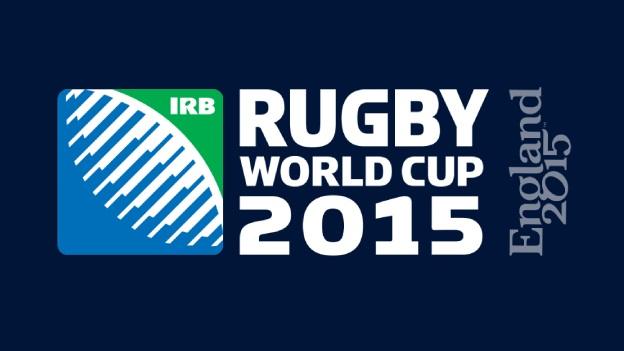Rugby World Cup: France battling themselves as well as All Blacks
- Published
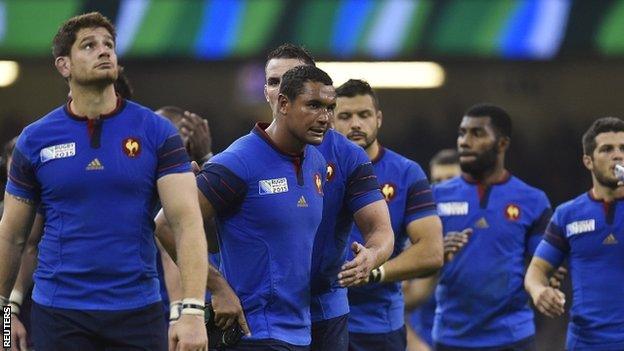
Now captain, Thierry Dusautoir (second left) was inspirational in France's 2007 World Cup win over the All Blacks
Rugby World Cup quarter-final: New Zealand v France |
|---|
Venue: Millennium Stadium, Cardiff Dates: Saturday, 17 October Kick-off: 20:00 BST |
Coverage: Live on BBC Radio 5 live, plus live text commentary on the BBC Sport website. |
"If we don't rebel this week, then we will never rebel," says France head coach Philippe Saint-Andre. Sounds feisty. But rebel against what? All Blacks tyranny? The depressing conservatism of French rugby? Himself?
Saint-Andre's cryptic utterances before Saturday's quarter-final against New Zealand in Cardiff encapsulate the pickle the French national team are in.
Liberation, the French newspaper founded by existentialist philosopher and novelist Jean-Paul Sartre,, external has called Saint-Andre's team "world champions of destruction". Not of rival teams, but of a proud rugby tradition and "the dreams of their public". It is difficult to disagree with the sentiment.
Where France were once joyously capricious, they are now grimly predictable. Big boys up front, big boys out back. Boom! Wherever you seek them, they'll be there. Indeed, if one man symbolises his country's modern rugby philosophy it is centre Mathieu Bastareaud - built like a beer barrel and too often he plays like one, too.
Bastareaud, whom Liberation described as "a symbol of passive dissuasion" during France's chastening 24-9 defeat by Ireland last weekend, has been dropped for the game against New Zealand. The more expressive Alexandre Dumoulin comes into the back-line, but the All Blacks won't lose sleep.
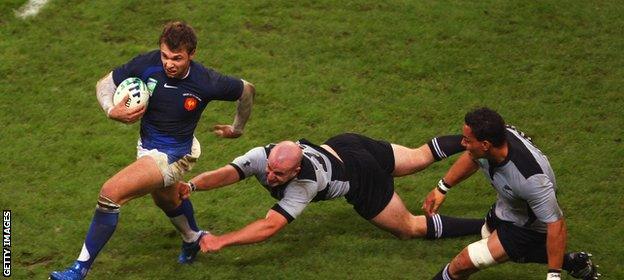
Winger Vincent Clerc inspires France during their victory over New Zealand in Cardiff in 2007
You can change players on a whim, but not a philosophy. Which leaves France blindly grasping at the past for inspiration, hoping something sticks.
The Millennium Stadium is, of course, the scene of one of the Rugby World Cup's greatest upsets. In 2007, a group defeat against Argentina having condemned them to a quarter-final against favourites New Zealand in Cardiff, France overturned a 13-3 half-time deficit to turn out 20-18 winners., external
It wasn't the first time. In their 1999 World Cup semi-final at Twickenham,, external France trailed a Jonah Lomu-inspired All Blacks 24-10 at the break before locating that 'mysterious' switch. France eventually won 43-31, in what was perhaps the greatest rugby match in history.
Outside of World Cups, there was 'the try from the end of the world', when Saint-Andre sparked a sweeping counter-attack inside his own 22 before Jean-Luc Sadourny went over to steal the game in Auckland in 1994.
But, in truth, the mysterious switch never used to be mysterious at all, it was always there in plain sight, waiting to be pulled. Indeed, French teams of the past didn't have one switch, they had switches, triggers and levers all over the park.
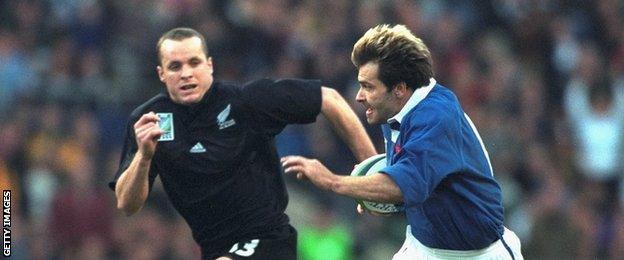
Christophe Dominici sprints clear of Christian Cullen during France's 1999 victory at Twickenham
As well as Saint-Andre and Sadourny, that 1994 team contained the great Philippe Sella and Thierry Lacroix.
In 1999, there was the wily Christophe Lamaison, the quicksilver Philippe Bernat-Salles and the brilliant Fabien Galthie at scrum-half. In 2007, there was the slippery Vincent Clerc and a young Frederic Michalak off the bench.
And down in the fire room, providing the steam, there were always fearsome forwards, from Abdel Benazzi to Fabien Pelous and Raphael Ibanez.
Against Ireland on Sunday, not only did France lack inspiration in the backs, they were also a mess up front, their line-out in tatters and the scrum in retreat. It was quite pitiful to behold.
Michalak is still there and will start against the All Blacks. But he sums this French team up: sometimes brilliant in club rugby, for France he is often ordinary. Or worse.
Watching Michalak desperately trying to get this French team to open up when needed is like watching a dreary brass band suddenly being asked to play jazz mid-concert, while blindfolded.
Still, France are making all the right philosophical noises. "We can't only defend," said winger Brice Dulin. "We must not be minimalists."
"We must not think, we must just play rugby," added Saint-Andre.
It sounds like the French game-plan was hatched in a smoke-filled cafe on Paris' intellectual Left Bank.
More from rugby union: |
|---|
For the latest rugby union news, follow @bbcrugbyunion, external on Twitter |
At least France captain Thierry Dusautoir, one of his side's few genuinely class acts, knows what it takes. In 2007 in Cardiff, Dusautoir made 38 tackles - more than the entire All Blacks team - and scored a try.
In the 2011 final, Dusautoir made 20 more tackles, scored another try and was man of the match as France were beaten 8-7 by hosts New Zealand in a horribly tense encounter in Auckland.
"You always have reasons to believe," says the Toulouse colossus. "I have played 11 or 12 times against the All Blacks and not once were we favourites. But that didn't stop us from beating them."
Dusautoir has actually beaten the All Blacks twice, the other occasion in Dunedin in 2009. But New Zealand have won all eight Tests between the sides since.
Those French fans looking to the 2011 final for hope should not forget that while their squad spluttered terribly four years ago before somehow managing to stumble into the tournament decider, it actually contained some very decent players in addition to Dusautoir.
And the All Blacks they came up against in the final were a nerve-wracked, injury-riddled outfit, down to their fourth-choice fly-half.
This time around, France are almost entirely lacking in switches, triggers and levers. The All Blacks, meanwhile, are battle-hardened by four competitive group matches, pretty much at full strength and have so many switches, triggers and levers they don't know which one to pull next.
If creative life "begins on the other side of despair", as Sartre once wrote, then France have a glimmer. But despair is only a motivation, you also need the flair.
- Published18 October 2015

- Published16 October 2015

- Published17 October 2015
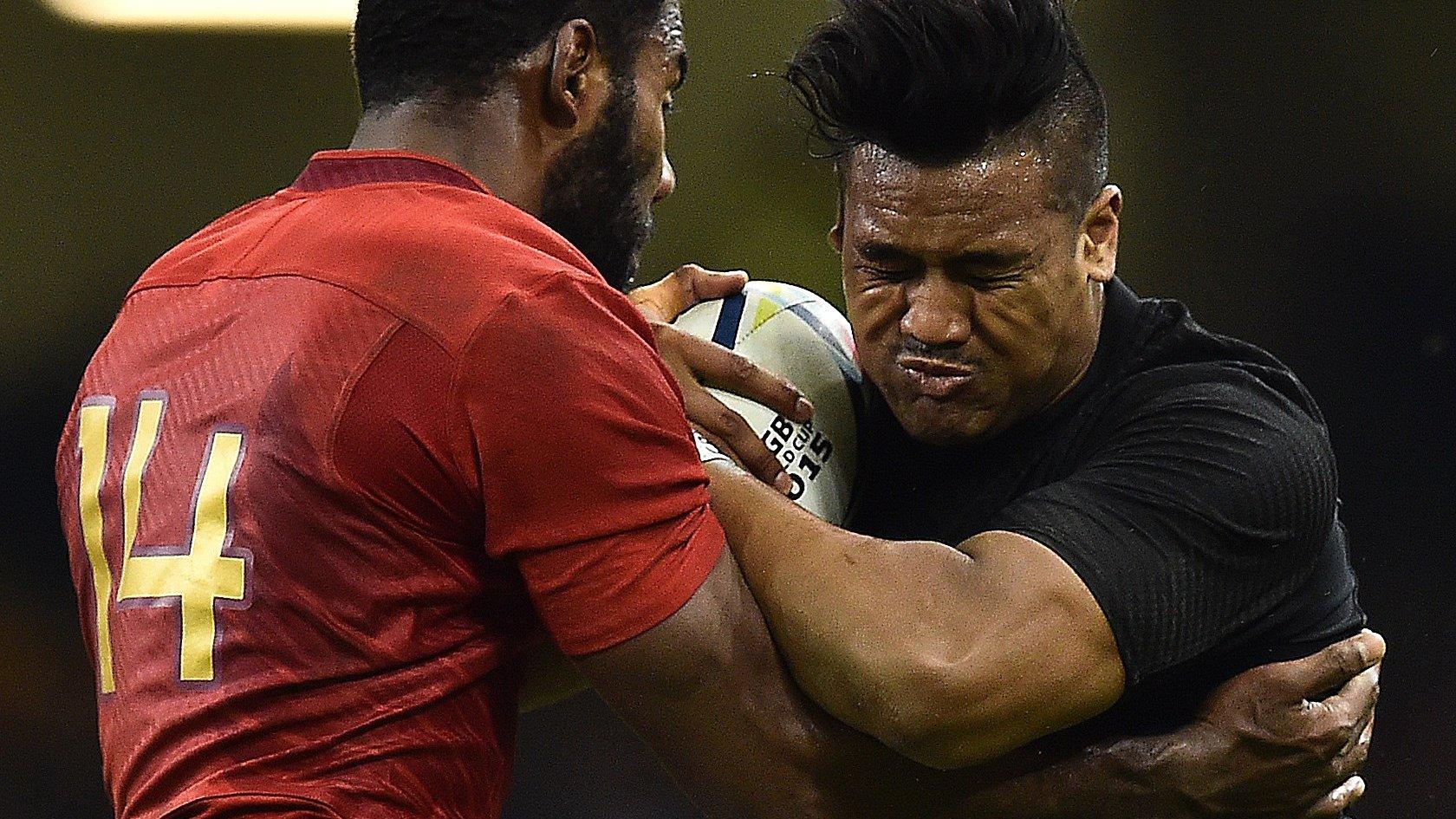
- Published18 September 2015
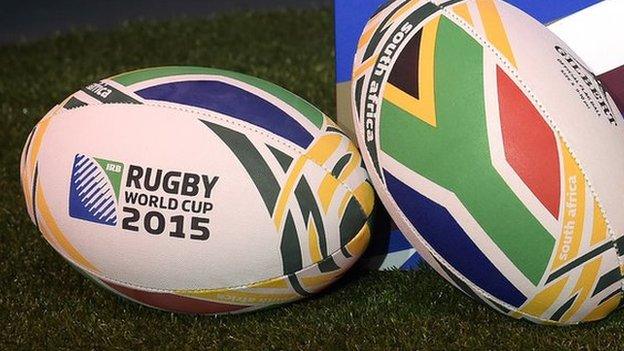
- Published3 February 2017

- Published14 September 2016

- Published15 February 2019

- Published25 September 2015
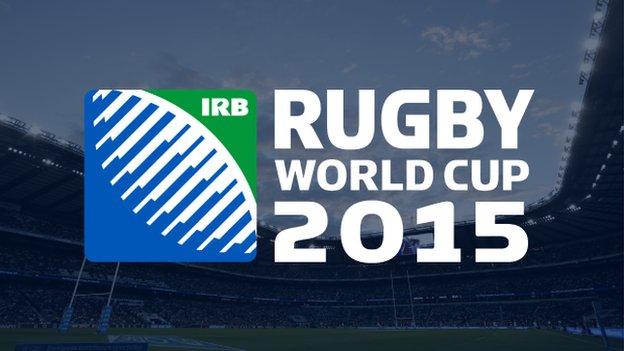
- Published8 September 2015
